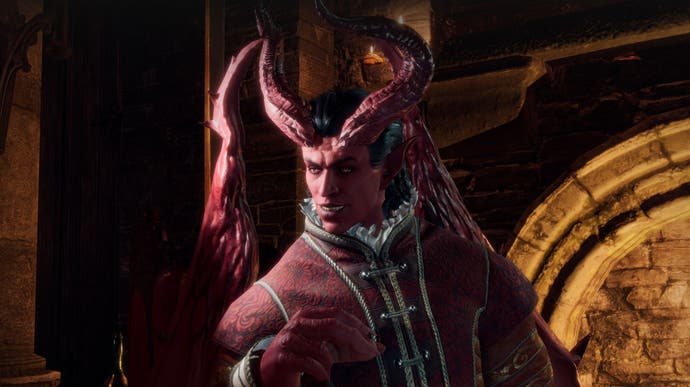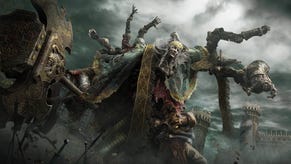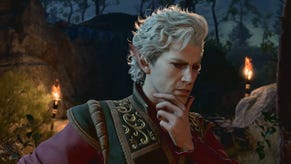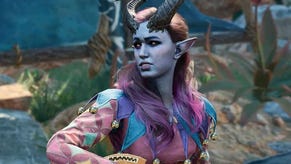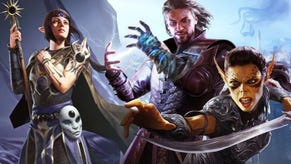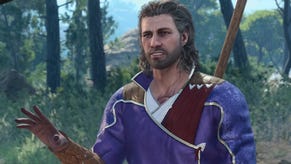"I don't think current-gen consoles would be able to run Baldur's Gate 3"
Larian Studios talks Stadia, triple-A development and the "darker" side of D&D lore.
Larian has finally shown off some Baldur's Gate 3 gameplay, via their panel at PAX East today, and as you might have already read in our preview, it is very impressive.
But, impressive as it may be, there are still plenty of questions for Larian to answer. It's self-publishing the game, which is quite remarkable given its scope and reputation. It's one of the first major games to be releasing simultaneously on Google Stadia and other platforms - at this point just PC - and there's been an assumption amongst some that this would mean Google would have some kind of say in things, akin to a first-party relationship the likes of Sony and Microsoft have with some games on their own platforms.
And then there's, you know, the actual game itself. Larian's Divinity: Original Sin and Original Sin 2 garnered a reputation for brilliant turn-based action, but Baldur's Gate is known for its real-time with pause system, so how will they bridge that gap? How will they manage the darker tone when Divinity has been as much a comedy, in recent years, as a heavier fantasy drama? And will there be a Dungeon Master mode, what with Baldur's Gate being driven by the rules of Dungeons and Dragons itself?
You can read our conversation with Larian's David Walgrave, executive producer on Baldur's Gate 3, about all of that and more just below. And if you haven't already, be sure to run the rule over our detailed impressions of the game in our big Baldur's Gate 3 preview, based on a good three hours of live, hands-off gameplay that went on a little while longer than what you'll have seen from Larian's reveals so far. It also features a gallery with lots of pretty pictures from the already gorgeous "pre-alpha" build of the game, too.
How'd you feel the gameplay presentation went? Happy? There was a lot of chaotic energy...
David Walgrave: Yes! When we do these presentations, we have the script in mind so that we cover everything that we want to cover. Because it doesn't look like it, but we do have a plan with it. And then you enter the chaos factor Swen Vinke, and as a developer your heart stops every time he does something. He goes like, "Oh but I could also try this" and you're going "No! You can't!" [laughs].
So it's always a bit of an adventure but I think - what we are trying to show - is that there are so many options and choices and ways that things can go. And we have actually implemented all of them. What we don't always know is whether they work or not, at this point. But I'm very confident of the systems. So for instance, dialogue choices and scripting, that's something that can break because QA is still going through the game. But systemics is a thing that we've been building up for the last decade or so, and systemics we can trust.
But I do think - or I hope - that from the presentation, you see what we're trying to do with Baldur's Gate.
I think it's pretty clear.
Walgrave: Thank you!
So, this came up when Baldur's Gate was first announced - the studio's grown a huge amount. You've got a team of 200 people at least internally if I have that right, and then like another hundred externally? It sounds massive.
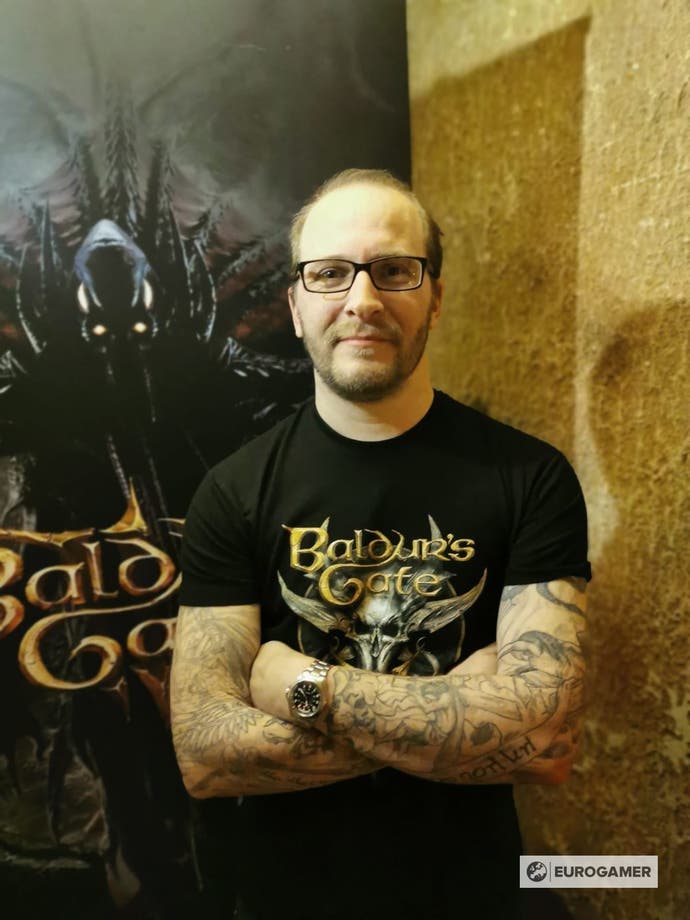
Walgrave: I think [internal, full-time] Larian people now is 250, and outsourcers 50 or something - so it is massive compared to a couple years ago. We did exponentially grow, but it was because we needed to make Baldur's Gate 3. We cannot make Baldur's Gate 3 and everything that we should do to honour it, and to move on with the company, with [only] the people that we had for Original Sin 2. So we had to explode. We had to expand. But I think that we're handling it very well, because there are things that you can learn from companies that have done similar things. So you can anticipate, like, where it can go wrong. We also hired a couple of people that we never had before: we actually have a lawyer now, we have a COO, we have accountants and deputy accountants, like all these things that as a normal game developer or company you go "oh we don't need that". [laughs]
And those people have experienced backgrounds and they can teach us a lot of things, like they have experience with building up companies, especially in Belgium. So they assisted us with all these things. To be honest, we learned a lot from Original Sin 2 for development processes and everything. So I, currently, can finally see what the past two years have done to us [in terms of] growing. We have people that are focusing on hair! You know, it has become- we used to be a very generalist company, like a lot of people did a bit of everything, if you were an artist, you were not focusing on one particular thing, and so on. Right now we do. We have people that are like, making moustaches for months. I'm going, "You're the moustache guy, really?!"
I'd quite like to be the moustache guy.
Walgrave: I'm exaggerating a bit, but I'm just saying like, there are now people that we have that I couldn't have imagined a couple of years ago. And now that everything's coming together, it's really working out, because we also want to make it so that the game really gets what it deserves.
And let's not mince words, we have the money to do it. So we're applying the budget that a game like Baldur's Gate 3 really needs.
Would you call it a triple-A game now, at this point?
"I really don't think you can make Baldur's Gate 3 without saying this is going to be a triple-A game."
David Walgrave.
Walgrave: Yes. I think, for instance what you've seen, with the lip-synching and the cinematics, the motion capturing that we're doing - I think you're still seeing it in "raw" form. But we do know what it can be, and we have again hired a couple of guys with a lot of experience. The cinematic producer and the cinematic director come from Telltale. This is what they've been doing for the last five, six years. They know what they're doing, they know what to request from the team that hasn't done anything like this before. So, if you see that - and if you see all the technical stuff that has gone into our engine - I would call it a triple-A game. It has a triple-A budget, has a triple-A team by now, and I think that is our aspiration.
We are still one hundred percent independent; we don't have anyone that we need to talk to. Apart from Wizards of the Coast, that still needs to agree on certain things that we do - but they did give us a creative carte blanche, almost - like certain things, we just need to check with them. But the relationship that we have with them is very good, and they're not being difficult about anything.
You mentioned the budget, where did that come from? You're self-publishing, so is that triple-A budget coming purely from Divinity: Original Sin 2's success? Is there investment from Google with the Stadia deal?
Walgrave: Yes, we do get support from Stadia, but again there's nothing that they can say about the game. We have certain agreements and deadlines with Stadia, but that's mostly about technical stuff. They want us to support a couple of typical Stadia features and we need to show that we do, and that's basically it. But I don't know everything about our financial background. I also think that we are managing our money intelligently. So I don't know what the accountants are for! They're probably, like, investing here and there so that our money is not just simply going into development, making sure that the money that we have in the bank is actually growing, or making money.
The production values are quite impressive, given you're more or less totally independent. The money definitely looks like it's on screen.
Walgrave: Well, it's a bit unreal. I've been working at Larian for 15 or 16 years, and we've always made things like Divine Divinity. Beyond Divinity I was there, and Divinity 2 et cetera. And you could always tell that we were not really triple-A, even though we were always aiming for it. We wanted to blow people away by using the money that we did have very smartly. And now we do have the budget, we're going to try and maximise the use of that again.
So is it triple-A? I really don't think you can make Baldur's Gate 3 without saying this is going to be a triple-A game.
You mentioned the Telltale people that have joined you. Have you got any of those typical "big name" writers on board? Your Chris Avellones, and the like?
Walgrave: No, we've worked with Chris before but for Baldur's Gate 3 [we're not]. We've been building our team of writers since Divinity: Original Sin 2 as well. I think we now have like a dozen writers, and some of them are very junior, some of them are very senior and have been working - like our lead writer, Jan van Dosselaer, has been working for us for I think 10 years as well. So he's really - it's not a "big name" - but to me he's really good at what he does, like a lot of the a lot of the really good writing is typical for him. When you really know the people that are working on the dialogue, you can recognise it and say "This guy's probably written by that writer".
And we have so many writers because we have so many dialogues and so many different consequences and choices. But we also give an origin character to a writer that's really good, because then they can really pour their soul into their character and their origin. And, to be very blunt, we didn't need a "well known" writer for now because I think that our team is really good.
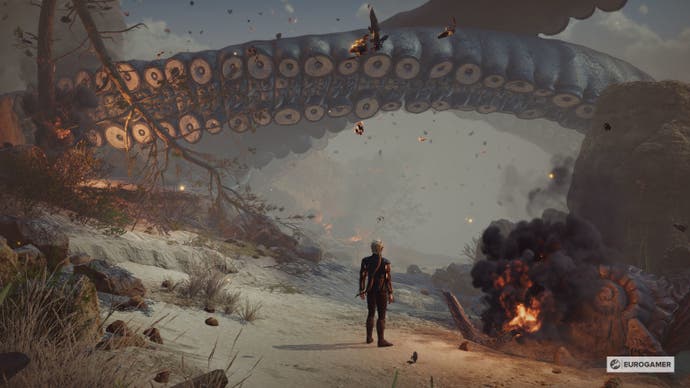
Did you pick the Telltale people up immediately after that sudden studio closure?
Walgrave: Mmhmm! There is an expression in Dutch and I'm sure that it exists in English as well. "One's death is another man's bread." It rhymes in Dutch, that's why it's an expression! So sometimes bad stuff happens to other people and you go like, "Well that's interesting, we needed those guys!"
Every time that we build a game, we look for something new to add on top of it. And mostly we don't stick to just one new thing. We want to have a couple of really unique features.
Like a Civilization-style rule-of-thirds, change 30 percent for each new game thing?
Walgrave: Yeah. It's not about change, it's about new stuff. We try not to throw away things that we know work. For instance, Divine Divinity is a very old game but there were things in there that we made because we didn't have a lot of people [that are still in Larian games now]. So systemics, for instance, is a very cheap way of making sure that you have a lot of gameplay that is consistent and that makes sense. And once you've programmed it, and you apply all these properties and these behaviours to all the items and the characters, you don't need to look at it anymore. And it's very simple. It's like how they made Elite. They had 64k and they made entire galaxies, with just like a couple of algorithms that could build an entire galaxy. And that's what we're trying. We hang on to it and we put stuff on top of it. Right now we just wanted to have really cool dialogues because we are focusing on character, and character building, and personalities and relationships.
And we felt, for instance, with Original Sin and Original Sin 2, there was a lot of personality in the characters, but as soon as you add a close up and someone is acting it out, it adds so much soul and credibility to it. Right now [during the demonstration], you got a lot of laughs and oohs and ahhs and people even clapping about stuff. And that's I think because it's so up close and personal, and you give these guys a character. And that's something that we said after Original Sin. "Okay, we need to make these dialogues come alive more." And then Telltale and...
With the systemics, it's clear that's a leading factor of what makes the game stand out and what it's trying to do, but is there any worry that when you add the Dungeons and Dragons elements on top of that, with the dice-rolls and that level of randomness on top, that it's a little complex? Or that beginners might struggle when coming to it?
Walgrave: Ooo! I think systemics work in any RPG that wants to work like that. So a lot of the stuff that we used to do with Divinity games and with tech was actually always inspired by the D&D stuff. For instance the last game, Original Sin 2, was all about surfaces and statuses and all that stuff.
Basically, if you play Baldur's Gate 2 and you use a couple of spells, it results in both surfaces [and statuses]. And right now, we can reuse the surface technology that we have. Because basically the handbook says, "Oh it can leave a fire surface and when you step into the fire..." so this is already in a D&D book, and it was in D&D in 1987. Which is probably why a lot of RPGs have it.
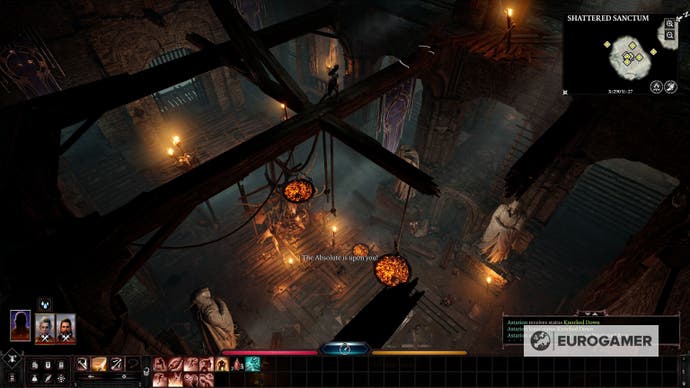
So I think it works well together because it's not out of place. You can still keep on doing the simulation and then plug it into the ruleset completely, because they work really fine together. Up until now, we haven't really noticed any problems. We had to tweak the numbers of it here and there, like: how do surfaces die out? When do they die out? How do we calculate chances of getting burned? How much is it? Dice rolls, damages, et cetera? Because that was all our own invention, but now we're plugging it into the D&D system. But these systems keep on surviving, it's not a problem.
And yes, it's a bit of a hard game. [laughs]
But you're comfortable with that, right? That's what you're going for.
Walgrave: The thing is, often it might be that what's in the D&D books is now what we're applying. So if people say things like, "Well, those goblins, they had a lot of HP!" we're like, "Well, my hands are tied here!"
So, we are going to do a balancing pass! We're also going to make sure that there's a story mode where you can focus on story and dialogues. But currently we're just applying the rules, and we have noticed that it is becoming - again, like we actually had before with Original Sin 1 and 2 - it's becoming one of those games where you need to use everything that you have. Where you need to drink potions instead of hoarding them and ending up with 274 healing potions that you never used. And that's, I think, what we want to teach our audience: use everything that you have, pick up everything that can be used. I mean Swen [Vincke, Larian's studio founder who ran the presentation] threw his shoes at a guy!
You're fighting tooth and nail against everything - and that's what we want, because that's always a challenge. We don't want to have, for instance, combat where you go like, "Oh, this is going to be a breeze" click-click-click and everyone's dead. That's not good combat. We don't do that.
You changed some stuff. Baldur's Gate 1 and 2 had "real-time with pause" combat, you've gone turn-based. The camera is that sort of third-person-isometric hybrid...
Walgrave: It's 2020!
Is that basically the reason why - you felt you needed to modernise it?
Walgrave: So, I think that in spirit it's still the successor of Baldur's Gate 1 and 2. Because there are so many things that people who did play and like Baldur's Gate 1 and 2 will still recognise in the new one. It's still about your party. It's still about big personalities clashing with each other and relationships. It's still a party-based game, you still need to do combat, you will recognise a lot of D&D rules - even if you haven't played D&D in 20 years. You will still recognise all the spells, et cetera.
So, to me it's a true sequel, but we are bringing it into the 21st century by saying, "Look, it's glorious 3D. It has really nice cinematics. We're taking it further with systemics, we applied the 'Larian philosophy', which is like, oodles of content and hidden features and hidden stuff everywhere." So to me it's a good sequel.
"Stadia's launch has been rocky but as a developer, you see it from a different angle."
David Walgrave.
The choices that we made are ours. Why did we go for turn-based instead of real-time with pause? Because D&D to us is a turn-based game and we're really good - or we have become really good - with turn-based combat. So that, I think, is one of our strengths, and trying out real-time with pause for now, just because the originals were that? It's a big risk. Because the team would have to think completely differently, our combat would be completely different. And we didn't really feel good about that. Normally we do try out a lot. Normally we try out a lot before we make a decision, but with real-time with pause and turn-based we didn't, we just said "Okay it's just gonna be turn-based."
The tone seems like a departure from Divinity at least - it's a lot darker, where the Divinity: Original Sin games were a bit more "sunny", right?
Walgrave: Well as soon as you get a tadpole in your head, and the Mind Flayers are threatening to take over the Forgotten Realms universe, and the githyanki come from god knows what plane and they're barging in... we were very inspired by one image which is in Volo's Guide to Monsters [a Wizards of the Coast-published companion book for Dungeons and Dragons] and all that stuff was like, the tadpole crawling into your eye. It's a graphic that's this big [makes a small shape]. But it inspired us: "Let's come up with a guy that has a tadpole in his head!" and everyone said like "It cannot be done!" and then we think: then it's a good idea. If everyone says it cannot be done, it's a good idea.
So we wanted to do a darker thing kind of because we are sticking to the lore. It's Forgotten Realms, it's D&D, you have all these locations, you have all these characters. And trying to give it the Larian treatment which is a bit more lighthearted and a bit more funny, would not blend well with the reality that is the established lore of the Forgotten Realms.
Are you doing the same co-op and multiplayer thing as with Original Sin? Is there going to be a "Dungeon Master" mode?
Walgrave: Dungeon Master we don't know yet. Because... it's not very easy to do it. I think that, for a Baldur's Gate game, it would make a lot of sense, and people would probably love it and use it a lot. Currently nobody's working on it. It's something that we want to do, but we don't know yet.
In terms of platforms, obviously you mentioned Stadia, you've also mentioned early access, which I assume is Steam [we now know this to be the case].
Walgrave: Yep.
Are you coming to other storefronts on PC, are you coming to consoles?
Walgrave: We are now focusing on PC and Stadia but that's it. I... did not prepare for this question so I have no idea [laughs].
So, the previous games, we ported them to PC, Mac, Switch, Xbox and PlayStation. Because when you've been working on a game for three years or so, you just want to maximise the audience, like let's sell it to more people!
Clearly it worked because you've got that nice budget...
Walgrave: Yeah I mean it's still selling. And I think especially for Baldur's Gate 3 - which will have just like, higher [expectations] and bigger attention from everyone - I think we'll work on it, but let's first make it for PC. Let's make it work.
Once it's done on PC and it does come to thinking about consoles, would that be next-gen?
Walgrave: Mmhmm! I don't think that current-gen consoles would be able to run it. There's a lot of technical upgrades and updates that we did to our engine, and I don't know if it would be capable of being able to actually run on those things.
Maybe it could run, but then we would have to tone down the textures and this and that and it wouldn't look as cool anymore.
What's the nature of your situation with Stadia - is it early access first, then Stadia, then full release on PC?
Walgrave: Were releasing simultaneously on Stadia and on Steam in early access.
So it'll be sort of "Stadia early access" as well as Steam Early access?
Walgrave: Yeah. I don't think Stadia has a word for it. But, I don't think the contract explicitly says that we need to be on Stadia first or something like that.
Do you feel happy with how their launch is going so far? Because it has been a little bit rocky...
Walgrave: It's been rocky but as a developer, you see it from a different angle. So you know what's going on, you know what they're doing. You also understand because you're also a developer. So as a gamer, if you've invested in it, and you're waiting for updates and new stuff, then I can imagine that you're frustrated. But they also have good people that are working on it.
In terms of the technical stuff that that brings, there are a lot of promises there - do you feel the benefits of that? Is it like "wow the power of Stadia" and it's really changing the game, or is it just like developing on PC or anywhere else?
Walgrave: The cool thing about Stadia is that, for a very long time during development, we did not have to take care of optimisation so much. So, normally during development what you do is you write big pieces of tech, and then you start optimising. And obviously, as any "good programmer" should, you should optimise constantly and blah-blah-blah. But in the reality of development, you sometimes really want to just pump out whatever so that the designers, for instance, can start working. Stadia, having all this processing power behind it, makes you go like "Y'all, here's the new feature," and you can just pump up whatever you want. So in that regard, it was a big advantage. And now we can start focusing on optimising. So yeah, it helped.
